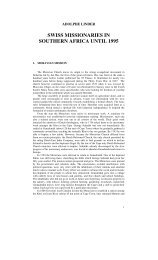THE SWISS IN SOUTHERN AFRICA 1652-1970 - swissroots-za.ch
THE SWISS IN SOUTHERN AFRICA 1652-1970 - swissroots-za.ch
THE SWISS IN SOUTHERN AFRICA 1652-1970 - swissroots-za.ch
You also want an ePaper? Increase the reach of your titles
YUMPU automatically turns print PDFs into web optimized ePapers that Google loves.
there to form a settlement to supply fresh provisions to passing ships. This first<br />
European settlement at the Cape ended in failure. Jan van Riebeeck used penguin eggs<br />
gathered on the island as an important source for food during his first year at the Cape.<br />
He considered Robben Island as a place of refuge, if his settlement on the mainland was<br />
endangered by the Khoi. When his position became secure, he threatened the Khoi<br />
leaders with banishment there, should they not comply with his demands. It was not<br />
long before the island became a penal colony to whi<strong>ch</strong> convicts were sent to labour in<br />
lime stone quarries, breaking mu<strong>ch</strong> needed building stones. Robben Island was used in<br />
this manner until very recently when the last political prisoners were released from the<br />
island. It also served as a leper colony during the latter part of the nineteenth century.<br />
Altogether 27 Swiss were condemned to corporal punishment, hard labour or<br />
incarceration. Of these at least 14 spent time on Robben Island. See Table 9 (p. 25)<br />
David Hypze “of Switzerland” in 1697 was caught picking up goods washed ashore<br />
from Company ships wrecked in the bay and sentenced to two years hard labour in<br />
<strong>ch</strong>ains. Jan Jacob Wald of Milde near Berne was condemned to five years hard labour<br />
after a boisterous drinking party at a burgher’s house. Claas Loubser of Fräs<strong>ch</strong>els FR, a<br />
burgher of the Cape, was found guilty of defrauding the Company and sentenced to two<br />
years hard labour on Robben Island, whi<strong>ch</strong>, let us hasten to add, was commuted to<br />
labour on public works.<br />
For lesser offences painful corporal punishment and deportation was often imposed.<br />
Bartholomeus Jurger of Portels SG, a burgher found guilty of many illegal activities,<br />
was branded, scourged and banished to Mauritius. Leendert Meynraad of S<strong>ch</strong>affhausen<br />
and Charl Etienne Kiegel of Neu<strong>ch</strong>atel were banned and sent away in 1712 and 1766<br />
respectively.<br />
For any Company servant to absent himself from work or strike his superior was<br />
regarded as a grievous offence and the punishment imposed was certainly a deterrent. In<br />
1733 Adriaan Vermaire of Basel stayed away from work for three days and was sent in<br />
<strong>ch</strong>ains to labour for six months in the quarry on Robben Island. When, in 1705, Jan<br />
Jacob Peroude of Neu<strong>ch</strong>atel struck his foreman, he was sentenced to eight years labour<br />
in <strong>ch</strong>ains on the island. Three years earlier Willem Soeter of Berne, on loan to a farmer,<br />
was whipped and fined for breaking his contract and taking service with another<br />
because, he said, of poor treatment.<br />
Deserters and mutineers at sea could expect the death penalty or long years on<br />
Robben Island. Nicolaas Basje of Lucens VD was hanged in 1675 and his body left<br />
hanging as a prey for the birds. Jacon Boery of Zuri<strong>ch</strong> was placed against the execution<br />
post and shot in 1748. Four Swiss, amongst them 23 year old Honore Brune of Nyon<br />
VD, took part in a plot to mutiny at sea in 1766 and were sent in <strong>ch</strong>ains to Robben<br />
Island where all appear to have died.<br />
During periods when the Netherlands was at war with France, Fren<strong>ch</strong> speakers could<br />
expect particularly severe sentences. Jean de Seine from “Griesons”, a freeman, was<br />
heard discussing the possibility of a Fren<strong>ch</strong> landing and was sent in <strong>ch</strong>ains to Robben<br />
Island for ten years. Murder of course carried the supreme penalty. When Isaac<br />
Boshuysen of Geneva, a burgher of Stellenbos<strong>ch</strong>, was party to a fatal assault he was<br />
lucky to be convicted to 20 years labour at the public works.<br />
Hangings, corporal punishment and the like were carried out in public by the<br />
executioner, assisted by black slaves. No doubt it takes a special type of person to inflict<br />
the sometimes gruesome sentences and not surprisingly he was shunned by the people.<br />
Jan Weis of Solothurn must have performed his tasks well; he was retained as<br />
executioner for 18 years, from 1762 to 1781. His pay was approximately equivalent to<br />
that of a sergeant. At about the same time the position of head goaler was also filled by<br />
a Swiss, Hendrik Swarts of Winterthur ZH.<br />
4.9 The Swiss Regiment Meuron at the Cape 1783-1795 1<br />
During the American War of Independence 1778-1783 popular sympathies in France<br />
and the Netherlands lay with the Americans and this led to open warfare with England<br />
in 1780. Within a short time England captured several Dut<strong>ch</strong> colonies. But for the<br />
timely arrival of a Fren<strong>ch</strong> fleet under Admiral Suffrens, they would also have taken the<br />
26







